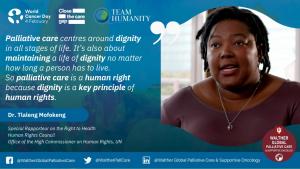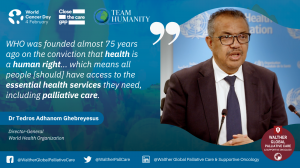
UN, WHO, Health Experts, and Patients Team Up on World Cancer Day to Assert Palliative Care as a Human Right
Walther Global Palliative Care & Supportive Oncology, Team Humanity & global experts from UN Human Rights Office & WHO call for equal access to Palliative Care
INDIANAPOLIS, IN, USA, February 3, 2023 /EINPresswire.com/ -- On World Cancer Day, Walther Global Palliative Care & Supportive Oncology, Team Humanity, global health experts, patients, and international leaders from the UN Office of the High Commissioner for Human Rights and the World Health Organization call for equal access to palliative care, highlighting it as a human right in order to “Close the Care Gap,” the theme of this year’s World Cancer Day.
Inequities in Cancer & Palliative Care
Half of the world’s population lacks access to essential health services according to the World Health Organization (WHO), and such access is also characterized by inequality intensified by factors such geographic location, age, ethnicity, and other dynamics including socioeconomic status. These remain important “social determinants of health” and strongly influence the quality of care that one has or has not. Such disparities are also reflected in situations where people face cancer, with many patients denied prevention and treatment worldwide.
With the population aging and rising burdens of diseases such as cancer, there is also an increasing need for focused care which includes pain and symptom relief for anyone with a life-threatening or serious illness. That is called palliative care.
In addition, COVID-19 heightened global attention and exacerbated the need for palliative care around the world. It also highlighted the massive inequities in access to palliative care, with cancer patients profoundly and disproportionately affected. In fact, each year there are an estimated 56.8 million people in need of palliative care worldwide, many of them are cancer patients.
Palliative care offers dignity and relief to those with cancer and other life-threatening illnesses. It is scientifically proven to dramatically improve the quality of life for patients and family members alike. While it is not explicitly stated in the Universal Declaration of Human Rights (UDHR), palliative care, which is based on dignity, falls within the domain of international human rights, specifically under the right to health.
However, nearly 90% of the world’s population does not have access to palliative care and pain relief, according to the WHO. Equally as staggering is the lack of access to essential medicines, such as morphine, for palliative care and pain relief, even for cancer patients, and it remains out of reach for most of the world despite it being affordable, considered the “gold standard” for cancer pain relief, and on the WHO List of Essential Medicines since the 1970s. This pathos has worsened with the COVID-19 pandemic, given profound disruptions in supply chains and extreme burdens on already-fragile health systems. Yet, several declarations at international bodies, such as the UN, as well as a 2022 Joint Call to Action by the WHO, UN, and INCB strive to urge and support demonstrable actions to bridge this gaping access abyss. Yet, these massive disparities foist millions of people around the globe to continue suffering needlessly, including patients with cancer.
“WHO was founded almost 75 years ago on the conviction that health is a human right… which means all people [should] have access to the essential health services they need, including palliative care,” says Dr. Tedros Adhanom Ghebreyesus Director-General World Health Organization in a new video “The Power of Palliative Care in Cancer: Access, Dignity & Human Rights” released in time for World Cancer Day by the collaborative team of Walther Palliative Care & Supportive Oncology at Indiana University, Team Humanity, and Ethan Films.
In this ten-minute, compelling film shot worldwide, key experts and patients ranging from Uganda, Malaysia, Nigeria, Switzerland, Panama, South Africa, United States and Spain share stories from their countries and first-hand experiences, keen insight, and expert knowledge of these inequities. Each person who appears expresses their commitment to continuing to pursue a collective goal that will enhance humanity: equitable access to palliative care.
One of them is Dr. Tlaleng Mofokeng, Special Rapporteur on the Right to Health of the Office of the UN High Commissioner of Human Rights, appointed by the UN Human Rights Council in 2020. As a medical doctor from South Africa, Dr. Mofokeng has extensive expertise in working with underserved and disenfranchised populations and advocating for universal access to health. In this video, she compellingly affirms the connection between palliative care, dignity, and human rights: “Palliative care centers around dignity in all stages of life. It's also about maintaining a life of dignity no matter how long a person has to live. So palliative care is a human right because dignity is a key principle of human rights.”
A Team by Humanity, For Humanity & the Human Right of Palliative Care for all Humanity
Walther Palliative Care & Supportive Oncology in collaboration with Team Humanity, are working to change global inequities, to advance access to global palliative care, calling for palliative care not only to be integrated and strengthened in health systems, healthcare training, access, and policies but also that Palliative Care is implemented as a fundamental human right worldwide.
Dr. Jim Cleary, Director, Walther Palliative Care & Supportive Oncology; Medical Director and Chair of Supportive Oncology at Indiana University (IU) Simon Comprehensive Cancer Center and Walther Senior Chair of Supportive Oncology, IU School of Medicine asserts: “Most people in Low-and Middle-income countries present with advanced disease because there is a lack of doctors to diagnose them, disease spread elsewhere in the body and this often causes great pain, and then they don’t have access to the pain medicines we need to make sure they are comfortable.”
Dr. Cleary continues by stating a collective hope, especially of those who advocate for Palliative Care as a human right: “What many of us hope for..is that everyone…throughout the world..will have access to palliative care.”
As part of the lead organization for World Cancer Day 2023, Union for International Cancer Control Head of Knowledge, Sonali Johnson, Ph.D. Advocacy and Policy assert “…a world in which everyone has access to the Palliative Care they need, regardless of who they are, how much money they have, where they live and whatever their prognosis: that is the world I would like to see; it is a more just world.”
Dr. Barbara Hastie
Walther Global Palliative Care & Supportive Oncology at IU
+1 317-278-4006
email us here
Visit us on social media:
Facebook
Twitter
LinkedIn
YouTube
The Power of Palliative Care in Cancer: Access, Dignity & Human Rights
Distribution channels: Business & Economy, Companies, Culture, Society & Lifestyle, Education, Environment, Healthcare & Pharmaceuticals Industry, Human Rights, International Organizations, Law, Media, Advertising & PR ...
Legal Disclaimer:
EIN Presswire provides this news content "as is" without warranty of any kind. We do not accept any responsibility or liability for the accuracy, content, images, videos, licenses, completeness, legality, or reliability of the information contained in this article. If you have any complaints or copyright issues related to this article, kindly contact the author above.
Submit your press release


